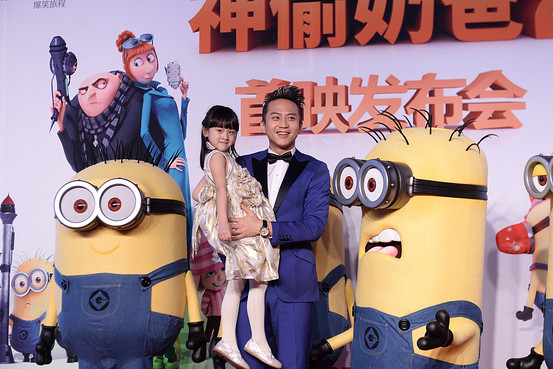China is embracing minion madness this week with the release of animated feature “Despicable Me 2,” after the country shut its door to the film four years ago. The animated sequel from Comcast Corp.’s Universal Pictures is set to open in Chinese theaters Friday.
The smash hit, which cost a mere $76 million to produce, has raked in more than $920 million world-wide since its release this summer, making it the highest-grossing animated film of 2013 and, as the company put it, “the most profitable film in Universal’s 101-year history.” The movie tells the continuing story of ex-supervillain Gru and his minions, who break apart evil schemes along with the help of Gru’s three adopted daughters.
“We are pleasantly surprised to see ‘Despicable Me 2’ finally land in China,” said Maria Koo, general manager of Universal Pictures in China. “It will give a wonderful ending to this film.”
The film’s first installment, which was released in 2010, didn’t make it to Chinese theaters, though it isn’t clear why. The state film regulator, which didn’t respond to a request for comment, doesn’t typically explain why certain imported films are greenlighted for the Chinese market and others aren’t. China caps the number of imported films shown in theaters each year to 34, with preference given to 3-D and IMAX movies.
Chris Meledandri, producer of “Despicable Me 2” and CEO of production company Illumination Entertainment, said in an interview that he was delighted to see the sequel finally hit China’s big screens, adding that he’s “excited to see how the audiences respond to it.”
China’s animated film market—and its audience—is growing rapidly. Box-office receipts for animated films hit 1.5 billion yuan ($248 million) in 2013, up from 630 million yuan in 2009, according to estimates from film-research firm Entgroup.
In Beijing, Shanghai and Guanghzou, more than 6.5 million people—about one-third of whom hold a college degree—watch animated films, according to a report by Beijing Normal University released last month. The report also found that imported animated films saw average box-office revenue of 80.4 million yuan in 2012, or about four times more than domestic animated films.
Last year, Dreamworks’ animated feature “The Croods” was pulled from Chinese theaters about two weeks ahead of schedule after raking in close to 400 million yuan at the box office. Some suspected the state film regulator pulled the film early to help make room for domestic animations instead.
But Mr. Meledandri, who has been seeking opportunities to collaborate with Chinese studios and animators, said he’s not concerned, noting that he sees a bright future for animation in China.
“All of my conversations that I had about collaborating with Chinese producers or animation studios have been very positive,” he said. “There is tremendous interest in what we are doing here, expressed by many people in China’s film industry.”
“We are learning the Chinese market and Chinese culture,” he said. “That will impact the evolution of our films as we move forward.”
Though the first installment of “Despicable Me” wasn’t released in Chinese theaters and many minion fans have already watched the latest installment—which is available for free online—Mr. Meledandri pointed to the use of 3-D in the film in theaters as well as the role of some Chinese celebrities as elements that would draw audiences.
Chinese veteran actor Deng Chao and Cindy Tian, a child star made popular by the recent hit TV show “Dad, Where Are We Going?” provide the film’s Chinese voiceovers for Gru and his adopted daughter Agnes.
– Lilian Lin. Follow her on Twitter @LilianLinyigu
Chinese Celebrity Agency, Chinese Celebrity Contact, Foreign Actor in China, Foreign Model in China, 外籍, 外籍童模, 外籍乐队, 外籍演出, 外籍演艺, 外模, 外籍演员

